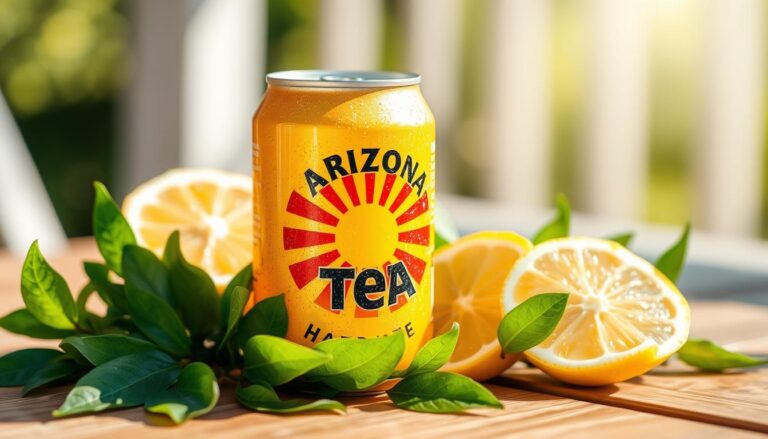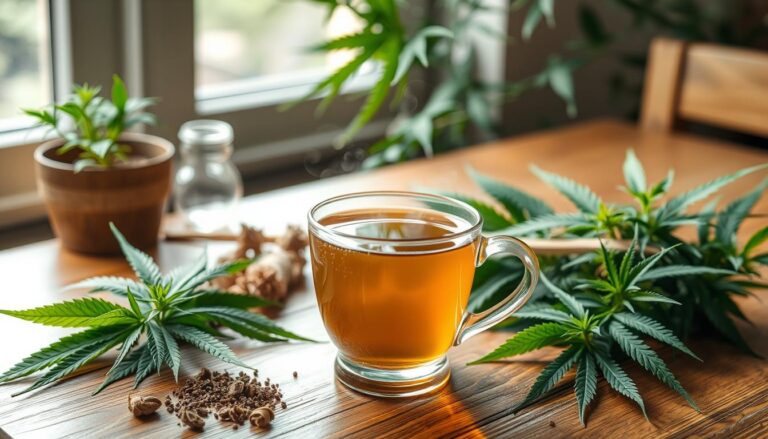Discover Equator Tea: A Taste of Tropical Paradise
As you sip your morning tea, imagine yourself in the lush, green landscapes of the equatorial regions. Equator Tea brings you a collection of premium loose-leaf teas. Each sip is a vibrant celebration of nature’s bounty.
Looking for a boost or a moment of calm? Equator Tea’s Health and Wellness Tea Collection is for you. These teas are made with natural, organic ingredients from pristine equatorial regions. They’re designed to support your well-being and help you live a balanced life.
Find the restorative power of turmeric, ginger, and mint blends. They help fight off colds and flu. Enjoy the calming notes of chamomile and lemongrass, or wake up with the earthy flavors of black tea with tropical fruits. Every sip of Equator Tea celebrates nature’s power to nourish us.
Table of Contents
Introduction to Equator Tea’s Rich Heritage
Equator Tea’s story begins in the lush, tropical areas near the equator. They focus on making teas that capture the essence of these places. Their dedication to quality and sustainability has made them a leader in the tea world.
Their teas reflect the unique conditions of the equatorial regions. Here, the perfect mix of temperature, rainfall, and soil makes for exceptional tea leaves. Equator Tea’s team carefully selects and processes the finest leaves, highlighting the tropical origins of each blend.
| Tea Category | Subcategories | Distinguishing Factors |
|---|---|---|
| Green Tea | Chao Qing, Hong Qing, Shai Qing, Zheng Qing | Categorized based on specific processing methods, with the oldest style of tea being green tea. |
| Yellow Tea | Huang Ya Cha, Huang Xiao Cha, Huang Da Cha | The rarest category of tea, with subcategories determined by picking grade. |
| White Tea | Bai Hao Yin Zhen, Bai Mu Dan, Gong Mei, Shou Mei | Involves the fewest processing steps of all tea categories, with four picking grades. |
| Oolong (Wu Long) Tea | – | The most diverse and aromatic category of tea, with a dynamic processing method that includes fermentation, kill green step, and roasting. |
| Black Tea | – | The most widely consumed tea type, accounting for around 75% of global tea consumption. |
Equator Tea’s commitment to sustainability and fair trade adds to their rich heritage. They deeply value the unique terroir of equatorial tea plantations. This approach has earned them a reputation for excellence and leadership in the global tea market.
“Equator Tea’s commitment to quality and sustainability has made them a standout player in the global tea market.”
The Unique Geography of Equatorial Tea Plantations
The lush tea plantations of Equator Tea are located near the equator. They have a beautiful landscape that makes their teas special. The warm weather, high humidity, and lots of rain are perfect for growing top-quality tea leaves.
Climate Conditions That Shape Tea Quality
The climate near the equator is ideal for tea plants. The temperatures stay around 20°C (68°F) all year. This lets the tea bushes grow well.
The humidity and rain make the soil rich. This keeps the leaves healthy and flavorful.
Soil Characteristics of Equatorial Regions
The volcanic soils in equatorial areas are full of minerals. These minerals add unique flavors to the tea. The tropical climate and rich soil make Equator Tea’s teas taste special.
Altitude’s Impact on Flavor Development
The height of the tea plantations affects the tea’s taste. Tea from higher places has a stronger aroma and taste. Tea from lower places is smoother and milder.
The special geography of Equator Tea’s plantations makes their teas stand out. Every sip takes you to a tropical paradise.
Sustainable Farming Practices in Tropical Tea Production
At Equator Tea, we focus on sustainable farming in our tropical tea production. We use organic methods and avoid harmful chemicals. We work with local farmers to keep the ecosystem safe and produce top-quality, organic tea leaves.
Sustainable tea farming is key to our work. We use eco-friendly practices like:
- Agroforestry: We mix trees and other plants with tea to boost biodiversity and soil health.
- Reduced pesticide use: We use natural ways to fight pests and cut down on synthetic chemicals.
- Renewable energy adoption: We power our facilities with solar and other green energy sources.
- Fair labor practices: We make sure our farmers and workers are treated fairly and paid well.
- Certification programs: We have certifications like Rainforest Alliance, Fair Trade, and Organic to prove our sustainable tea farming efforts.
By choosing these sustainable methods, Equator Tea makes high-quality, organic tea leaves. Our commitment to sustainability protects the environment and supports our tea plantations and local communities.
“Sustainable tea farming is not just a trend, but a necessity for the future of our industry and the planet. At Equator Tea, we’re leading the way in eco-friendly practices that protect the land and empower our local partners.”
The Art of Harvesting Equator Tea
Harvesting equator tea is a detailed process. It combines old methods with new quality checks. The tea pickers at Equator Tea are very careful. They pick only the best leaves for their teas.
Traditional Picking Methods
Tea leaves for Equator Tea are picked by hand. This tradition has been kept alive by tea farmers in the equatorial regions for generations. It lets the pickers choose the most vibrant and tasty leaves.
Their careful hands make sure the leaves are treated gently. This keeps their natural flavor and aroma intact.
Optimal Harvesting Seasons
Equator Tea harvests at the best times for each tropical tea type. They know the climate well and when it’s best for tea quality. This focus on the right seasons makes their tea stand out.
Quality Control Measures
Equator Tea has strict quality checks from start to finish. Their team watches every step to keep the tea top-notch. This commitment to quality makes Equator Tea a leader in equator tea.
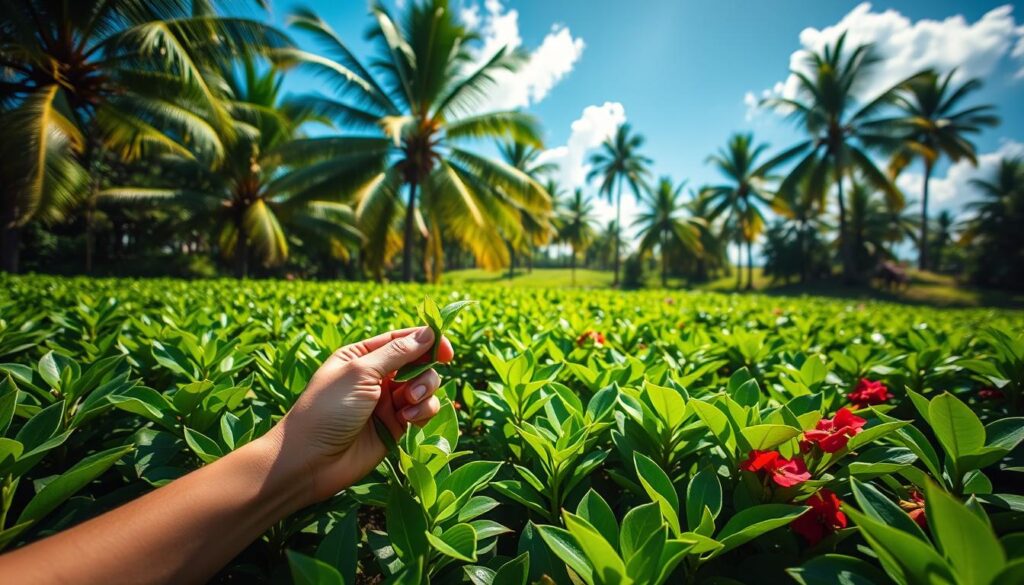
“The art of harvesting equator tea is a delicate balance of tradition and innovation, where every leaf is carefully selected to capture the essence of the tropics.”
Distinctive Varieties of Tropical Tea Blends
Equator Tea brings a world of flavors with its tropical tea blends. These teas are filled with the rich tastes of the equatorial regions. You’ll find teas with ginger for health benefits and chamomile with honey for calmness.
The brand also offers herbal teas that use local plants. These teas are made to excite your senses and bring a taste of the tropics to you.
One of Equator Tea’s highlights is the Assam Halmari Summer Black Tea. It’s a top-grade tea from the Assamica cultivar. It has a bright amber color and a smooth taste with hints of malt and caramel.
“The Assam Halmari Summer Black Tea offers a truly captivating taste of the tropics, with its rich, complex flavors and smooth, balanced profile. It’s a must-try for any tea enthusiast looking to explore the depths of equatorial tea blends.”
Equator Tea has something for everyone, whether you want a comforting tea or an exciting adventure. Try their exotic tea blends and start a journey to the tropics with your senses.
Health Benefits of Equatorial Region Teas
Equator Teas are famous for their health perks. These teas are not just tasty but also good for you.
Antioxidant Properties
Equator Teas are full of antioxidants. These fight off harmful free radicals in your body. They help keep your cells healthy and lower disease risks.
Immune System Support
Many Equator Teas have ingredients like echinacea and elderberry. These boost your immune system. Drinking these teas daily can help keep your body strong.
Natural Energy Boost
Equator Teas give you a natural energy lift. They do this without the caffeine jitters. A cup of tea can wake up your mind and body.
| Antioxidant-Rich Tea Benefits | Immune System Support | Natural Energy Boost |
|---|---|---|
| Combats free radicals | Echinacea and elderberry | Gentle, sustained energy |
| Promotes cellular health | Natural immune-boosting | No jitters from caffeine |
| Reduces chronic disease risk | Incorporated into daily routine | Invigorate mind and body |
Explore the health benefits of Equator Teas. Add them to your daily routine for a natural energy and immune boost.
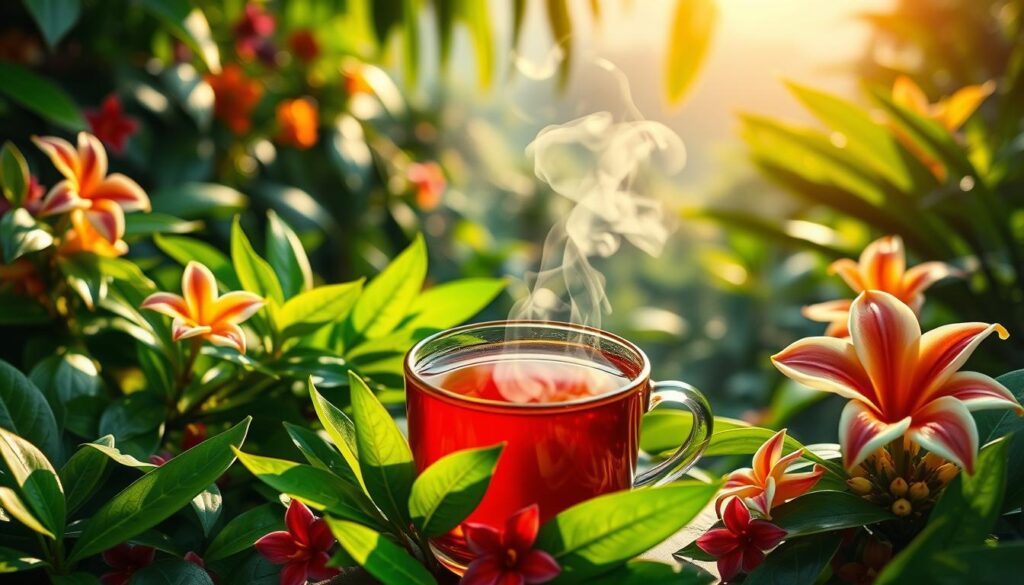
Fair Trade Practices in Equator Tea Production
At Equator Tea, we’re all about fair trade. We partner with tea farmers in equatorial areas. This means they get fair pay and better working conditions.
Our efforts help local communities grow and thrive. We also push for ethical business in the tea world.
Equator Tea is part of groups like Fairtrade International and Fair Trade USA. These groups make sure we meet high standards. This ensures our tea is made responsibly and openly.
| Fair Trade Initiatives | Impact |
|---|---|
| Direct Sourcing from Smallholder Farmers | Ensures fair wages and stable incomes for tea producers |
| Investment in Community Development Projects | Supports access to education, healthcare, and infrastructure in tea-growing regions |
| Adoption of Sustainable Farming Practices | Promotes environmental conservation and climate resilience |
| Commitment to Living Wages and Worker Safety | Enhances the well-being and job security of tea farm laborers |
When you buy fair trade tea from us, you help tea farmers and their communities. Our focus on sustainable tea farming looks to a better future. It’s for the people and places that make our teas so special.
Brewing the Perfect Cup of Tropical Tea
Discover the best way to enjoy Equator Tea’s rich flavors. With a few easy steps, you can make a cup of tropical tea that delights your senses.
Water Temperature Guidelines
The perfect water temperature for brewing Equator Tea changes with each type. Here’s a basic guide:
- Black Teas: 195°F – 205°F
- Green Teas: 160°F – 180°F
- Herbal Teas: 205°F – 212°F
Using the right temperature brings out the tea’s flavors, making each sip balanced and aromatic.
Steeping Time Recommendations
The steeping time also varies by tea type:
- Black Teas: 3-5 minutes
- Green Teas: 1-3 minutes
- Herbal Teas: 5-7 minutes
Steeping for the right amount of time lets the tea’s flavors shine. It prevents bitterness or astringency.
Storage Best Practices
To keep your Equator Tea fresh, store it right. Use an airtight container, away from light and moisture. This keeps the tea’s flavors and aroma locked in. Follow these tips to enjoy your Equator Tea at its best.
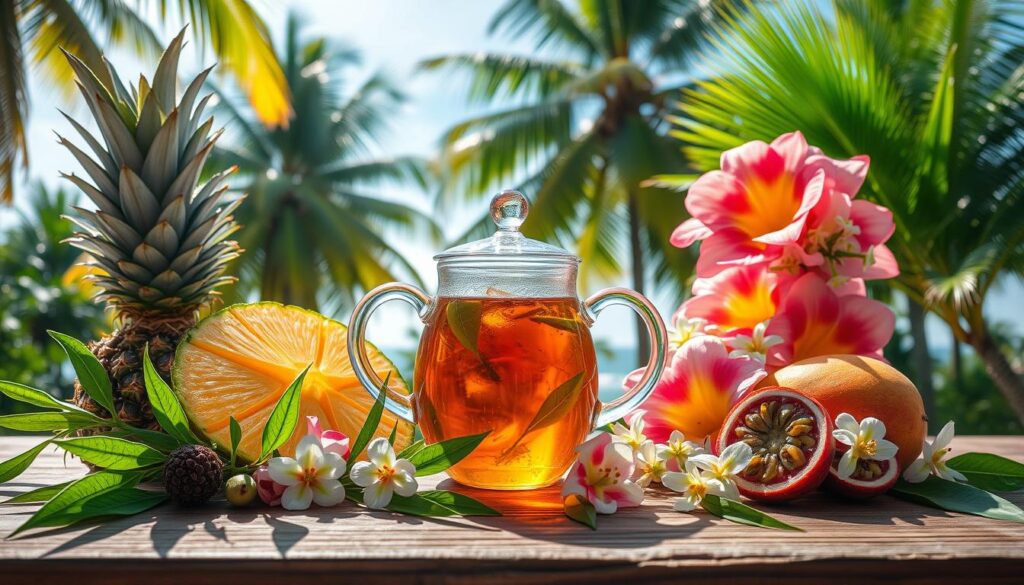
| Tea Type | Water Temperature | Steeping Time |
|---|---|---|
| Black Tea | 195°F – 205°F | 3-5 minutes |
| Green Tea | 160°F – 180°F | 1-3 minutes |
| Herbal Tea | 205°F – 212°F | 5-7 minutes |
Global Impact of Equatorial Tea Trade
The equator tea trade, including Equator Tea, has a big impact worldwide. It helps the economies of tropical countries and brings cultures together through tea. Fair trade by companies like Equator Tea also improves life in tea-growing areas and supports sustainable growth globally.
Climate change is a big threat to tea grown near the equator. Changes in rain patterns could hurt tea production in these areas. The rain zones that create a lot of the world’s rain might move north for about 20 years before going back.
| Climate Change Impact | Potential Consequences |
|---|---|
| Northward shift in rain-forming convergence zones | 0.2 degrees average northward shift expected |
| Tropical rainforest rainfall | Up to 14 feet of rain per year |
| Economic loss in developing countries | Significant long-term impact on GDP |
| Agricultural output changes | Projected yield changes from 2010 to 2050 |
Despite challenges, the fair trade equator tea industry is crucial for the global economy. It supports ethical sourcing and cultural exchange. Companies like Equator Tea are making a difference in communities worldwide.
“The convergence zones are foreseen to move back south after the 20-year period, remaining in that position for nearly a millennium.”
As we face climate change, the global fair trade tea trade will become more important. It will help communities in equatorial regions stay resilient and support their livelihoods.
Seasonal Tea Collections and Limited Editions
Equator Tea brings you a variety of seasonal and limited-edition teas. These teas highlight the exotic flavors from tropical areas. You can try new tastes all year, like teas for health during cold and flu season or special teas for cultural events.
Equator Tea’s seasonal teas include unique blends inspired by colors and collaborations with chefs and museums. Each tea, like the peach-colored PANTONE 13-1023 Peach Fuzz, is made with care. They respect the land where these teas grow.
Equator Tea is all about innovation and teamwork. They make sure their teas are sourced in a way that’s good for the planet and people. They invite you to try these special teas that celebrate the flavors and cultures of tropical regions.
FAQ
What makes Equator Tea’s collection unique?
What are the health benefits of Equator Teas?
How does Equator Tea prioritize sustainability?
What makes the geography of equatorial tea plantations unique?
How does Equator Tea ensure the quality of their teas?
What are the key factors in brewing the perfect cup of Equator Tea?
How does Equator Tea support fair trade practices?
What special collections or limited editions does Equator Tea offer?
Source Links
- Best of Ecuador vacation package,
- Crown Jewel Ecuador Pichincha Galo Morales Washed Mejorado – 33657-1 – SPOT RCWHSE | Royal Coffee
- Understanding True Tea: A Guide to Camellia Sinensis and the Six Categ
- Subscription 3
- Tea Harvesting and Processing Techniques and Its Effect on Phytochemical Profile and Final Quality of Black Tea: A Review
- Equator at Entebbe
- Rainforest Climate (Tropical Evergreen Climate) – PMF IAS
- Climate Zones Of Kenya: Different climate regions Of Kenya – Earth Site Education
- Where is Tea Grown
- Holiday Blend x TCHO Chocolate Bundle
- The four harvesting phases of coffee cultivation
- Unique Flavor Profile of Assam Black Tea
- Types of Black Tea: Ultimate Guide to Benefits, Flavors and more
- Assam Halmari Summer Black
- Guide: What Is the Coffee Cherry and Is It Edible?
- Is Hibiscus Tea (Zobo Drink) Safe for Pregnant Women?
- Premium Coffee Delivery Services – Perkaroma
- Ethical Teas
- What Makes Kenyan Tea and Coffee So Special? – beehive_restaurant_lounge
- Black Tea & All About Its Origin, Production, Taste & Type
- A Guide to Buying and Brewing Hibiscus Tea
- History of Elderberry Hibiscus Tea and How to Brew the Perfect Cup
- Tropical rains will shift northward in the coming decades
- The Socioeconomic Impact of Climate Change in Developing Countries
- Tea Projects – Collaborative Explorations | TEALEAVES
- A LIMITED EDITION COFFEE INSPIRED BY GASTRONOMY, MARKING NEW TERRITORY FOR NESPRESSO
- Rose Cardamom Tea Biscuit Cookies


